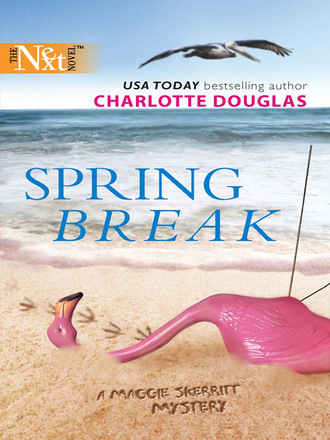
Полная версия
Spring Break
“I would if I knew how. Mother’s never liked me, and I haven’t a clue why.” The shrinks would have a field day with me, pushing fifty and still at odds with my mother. “She never approved of my career in law enforcement, but her dislike started long before that. Even as a child, I relied on Daddy to run interference between us. I wish Daddy were alive now.”
“Try sending flowers.”
I considered his suggestion. “A few dozen roses and crawling from here to her place on my bare knees might do the trick.”
“Just don’t wait too long,” Bill warned.
He spoke from experience. His only surviving parent, his father, resided in an Alzheimer’s facility in Tampa, and hadn’t recognized Bill for the past few months.
“Can we talk about something cheerful?” I asked.
“How about dessert?”
“Great. Tiramisu always makes me smile.”
Bill gathered dishes to carry inside. “I’ll have to hit the sack soon. I want to get up early to beat rush-hour traffic when I return to Sarasota.”
My tiramisu smile widened. Good food, great wine, my favorite dessert and early to bed with the man I loved. It didn’t get any better than that.
CHAPTER 2
With both the dog and my dognapping suspect in the wind, I was back at the office early Tuesday morning, calling boarding kennels and polishing off a double vanilla latte and a fresh cruller from the bookstore coffee shop downstairs, when Dave Adler sauntered in.
Adler had been my partner before the Pelican Bay Police Department went belly-up, and I’d developed a maternal attachment to the bright young guy. I considered him the son I’d never had and also held a special affection for his wife Sharon and daughter Jessica, an adorable toddler fast approaching the terrible twos. Ironically, I felt closer to the Adlers than to my own family.
“What happened?” I asked. “The Clearwater PD finally give you a day off?”
This was his first visit to our new office, and he was glancing with interest around the spacious, high-ceilinged room with its tall windows that overlooked downtown with its quaint shops, the marina and the waters of Pelican Bay. “Nice digs, Maggie. How’s the P.I. business?”
I shrugged. “Bill and I are staying busy. He’s working background checks in Sarasota this week. He’ll be sorry he missed you. How’s the job treating you?”
His confident, cocky attitude faded, and his handsome face sobered. “I need your help.”
“You got it.”
“We found a DOA at Crest Lake Park before dawn this morning, shot sometime last night with a small-caliber gun.”
The mere mention of murder made my skin itch. “You’ve worked your share of homicides. Why do you need me?”
He pulled at his earlobe, barely visible beneath his shaggy sandy hair, and scowled. “There were only two items found in her purse besides her driver’s license and wallet. The first was a slip of paper with your name and address on it.”
My skin irritation increased as I wondered whether I’d known his victim. Probably just a prospective client, I assured myself, not someone I actually knew. “What was her name?”
“Deirdre Fisk.”
“My God.” I sank back in my chair and struggled to catch my breath. “I haven’t heard that name in sixteen years.”
Memories assaulted me, images of pale, bloated bodies on the medical examiner’s table, young girls not yet in their teens, who’d been sexually abused, strangled and dumped into Tampa Bay.
“How did you know her?” Adler folded his tall frame into the chair across from my desk and waited.
I took a sip of coffee. “Deirdre Fisk was the lucky one.”
“Not last night.”
“Remember the cases I told you about, the child murders Bill and I worked more than sixteen years ago when we were partners on the Tampa PD?”
Adler nodded.
“Deirdre Fisk was only nine years old then. She was abducted by the man we assumed was our killer and taken to a mangrove on the Tampa causeway. She probably would have been murdered like the other three victims, except a couple of guys fishing a few yards offshore heard her screams. They started the motor on their boat and headed for the beach. At their approach, her abductor shoved her out of his vehicle and took off.”
“Did she ID him?”
I shook my head. “You know how kids are. She described him as an old man, which could have meant anybody over twenty. And driving a big white car. She didn’t know the make or model. The fishermen saw only taillights as the man made his escape.”
“So the guy was never caught?”
“The close call either scared him off—unlikely, since sexual predators can’t control their impulses—or, more likely, he moved away, or was arrested and imprisoned for some other crime, or died. Whatever the reason, the child killings stopped, and Bill and I never caught our perp.”
Adler pointed to the hives I was scratching on my forearms. “That’s when those started?”
“My allergy to murder?” I nodded. “That’s also when I left the Tampa PD and moved home to Pelican Bay. I thought working at the department here would cut down on my homicide cases.”
Adler’s laugh held no warmth. “You sure got that wrong.”
Before the Pelican Bay Department had been disbanded and local policing had been assumed by the county sheriff’s office in February, Adler and I had solved four murders in as many months.
“Now I’m chasing dognappers,” I said. “Much less pressure.”
But I couldn’t help remembering the scared little girl with silvery blond hair and big blue eyes, who had shivered with shock and terror while I questioned her about the monster who’d abducted her. And now she was dead. “Tell me about Deirdre Fisk.”
“Not much to tell,” Adler said. “That’s why I’m here.”
“Her family moved out of state after her ordeal. What was she doing back in the Bay area?”
Adler reached into his jacket pocket, extracted an evidence bag and slid it across the desk. “That’s the other item we found in her purse.”
I picked up the bag and read a recent newspaper clipping from the Tribune through the plastic. The article documented the presentation of a special scholarship to a Tampa teen by Florida’s governor. Accompanying the text was a photograph of the boy and his parents with the governor and, behind them, several other adults, whom the caption identified as members of the Florida legislature, including Juanita Menendez from Tampa, Ronald Warner from Bradenton, Carlton Branigan from Clearwater, and Edward Raleigh from Pelican Bay.
“Maybe Deirdre knew the teen or his family,” I suggested.
“It’s possible. But, according to the victim’s driver’s license, she lived in Pennsylvania.”
“That’s where the family moved after they left Tampa. Have you notified next-of-kin?”
Adler nodded. “Her parents are deceased. Her only living relative is an older sister Elaine, who moved back to Tampa a few years ago. I just came from her apartment, where Deirdre’s been visiting the past two weeks.”
“Did the sister say why Deirdre had my address and this news clipping?” I asked.
“That’s what I’m trying to find out, but Elaine’s not cooperating.”
“You think the sister’s involved?”
Adler shrugged. “Hard to tell. She didn’t want to talk to me about Deirdre’s business.”
“So why come to me?”
“The entire department’s covered up with spring break,” Adler said. “We’re all working double shifts, dealing with traffic, drunk and disorderlies, and other minor infractions. Since you already have a connection with the family, I’d really appreciate your interviewing the sister. See if you can find out what Deirdre was doing on this side of the bay in Crest Lake Park in the middle of the night.”
“You got it. When’s the autopsy?”
“Tomorrow morning at ten. Want to observe?”
The Tampa children’s murders had haunted my dreams and frustrated my waking hours for years. Getting involved with Adler’s homicide case would either put my nightmares to rest or stir them up again. My love/hate relationship with police work and my obsession to catch a killer who’d eluded me for too many years won out.
“I’ll be there. It’ll be good to see Doc Cline again.”
Adler stood to leave. He paused at the doorway and circled his face with his finger. “Get your Benadryl refilled. From the looks of the splotches on your face, you’re going to need it.”
As soon as Adler left, I asked Darcy to complete the calls to local kennels and vets in search of Roger, and I headed for Tampa.
Driving across the Courtney Campbell Causeway that spanned Tampa Bay, I passed four locations etched in my memory. Three of the spots were boat ramps where a young girl’s body had been brought ashore. The fourth was where the fishermen had discovered nine-year-old Deirdre Fisk, naked, freezing and traumatized.
Unlike those dark, tragic nights that I shuddered to recall, the road today was drenched with light. Towering oleanders, bursting with white and pink blossoms and shimmering in the brilliant sun, lined the causeway. Vehicles bearing out-of-state license plates jammed every lane. Most cars were overflowing with young people, luggage and coolers, and many sported surfboards, boogie boards, beach umbrellas and folding chairs strapped to the roofs. Everyone seemed bound for a beach and in no particular hurry to get there.
By the time I reached Elaine Fisk’s apartment complex in Temple Terrace, it was after eleven, but I doubted the woman had reported for work on the day her sister had been murdered.
I parked in a visitor space, climbed the stairs to Elaine’s second-floor apartment and rang the bell.
No one answered, but I could hear sound from either a television or radio inside.
I rang the bell again. “Elaine? It’s Maggie Skerritt. Will you talk to me?”
Someone switched off the sound inside, and a moment later, the door opened a crack with the chain still on. I pushed my ID through the opening.
“I’m sorry to bother you at a time like this, but I need to talk to you about Deirdre.”
The door closed. I heard the chain unhook, then the door opened again. Elaine Fisk blinked in the sunlight, her eyes the same pale blue as her sister’s, her hair the exact silvery blond, but uncombed and tangled. About thirty years of age, she was dressed in gray sweatpants and a Hard Rock Hotel and Casino T-shirt. Her feet were bare, and her face was swollen from crying.
“Come in.” She stepped aside, and I entered her living room.
The draperies were drawn and no lights were on. My eyes took a moment to adjust to the gloom. The apartment was filled with dark, heavy furniture, the kind many newcomers bring south from Northern homes and that doesn’t mesh with Florida’s bright sunshine and oppressive heat. A few knickknacks, porcelain statues and framed pictures cluttered the tabletops. Elaine motioned me to a sofa, turned on a lamp, and curled into a chair across from the couch.
“I’m sorry for your loss,” I said. “Detective Adler told me about Deirdre.”
Elaine, her eyes glazed with shock, nodded.
I glanced around the dreary room. “Is there anyone you can call to be with you?”
She hunched her shoulders. “Deirdre was all the family I had. My friend Katy’s working, but she’ll try to get off early this afternoon and come over.”
I hoped Katy could make it.
“I’m helping Detective Adler investigate Deirdre’s murder. Can you tell me why she was back in Tampa?”
Elaine gazed past me, her eyes unfocused. “She came to visit me. If she liked the area and it didn’t bring back the nightmares she had as a kid, she was planning to move so—” she swallowed hard “—so we could be together. Deirdre was lonely living in the big house in Pittsburgh after Mom and Dad died.”
“Why was she in Clearwater late last night?”
Elaine curled deeper into her chair and avoided my eyes. “I promised Deirdre I wouldn’t tell anyone.”
I took a full breath and spoke in my gentlest voice. “The only connection I had with Deirdre was when I investigated her abduction here in Tampa all those years ago. Was that why she wanted to see me?”
Elaine’s lower lip trembled. “I warned her not to stir things up again.”
“Is that why she was coming to see me?” I repeated. “About that case?”
She hesitated, then nodded. “But only if she was sure.”
“Sure of what?”
“That the man in the newspaper picture was the man who tried to kill her.”
“The picture in the clipping she was carrying from the Tribune?”
Elaine nodded again.
“Which man?” I asked.
She shook her head and twisted a lock of hair around one finger.
“I know you promised Deirdre not to talk about it, but you may hold the key to solving her murder.”
She appeared to consider my claim before finally saying, “Deirdre wouldn’t identify which man. She didn’t want to accuse anyone falsely. She said she had to see the man first and be certain it was him before she came to you with her suspicions.”
Deirdre’s body had been found in a park less than five miles from my office. Had she identified her assailant and been on her way to tell me? Or was she headed to Branigan’s house in Clearwater or Raleigh’s home in Pelican Bay and had met with foul play unrelated to the man in the newspaper photo?
“I’m sorry I can’t be more help,” Elaine said.
“There is one way you can. Do you have a recent picture of Deirdre I can borrow?”
Elaine removed a photograph from a frame on the table beside her and handed it to me.
I slid the photo into the pocket of my blazer. “I don’t know who killed your sister, but if it was the man who abducted her as a child, and if he thinks you might know about him, you could be in danger, too. Maybe you should move in with Katy for a while, until we get a better handle on what happened to Deirdre.”
She shrugged, apparently too numb with grief to feel fear. “I’ll see. When will they let me have her? I want to take her back to Pennsylvania and bury her beside my parents.”
“Detective Adler will let you know.” I took a business card from my pocket and handed it to her. “In the meantime, if you remember anything else or if you need me, give me a call.”
I stood to leave. Elaine remained huddled in her chair.
“Lock the door after me,” I said. “And don’t let anyone in you don’t know.”
An hour and a half later, I sat at the pass-through counter between my kitchen and dining room and ate leftover linguine for a late lunch. Then I called Adler to tell him what I’d learned from Elaine Fisk.
“Thanks,” he said. “You had better luck with her than I did.”
“I guess she trusted me because Deirdre trusted me. So what’s your next move?”
“I’ll track down Ronald Warner in Bradenton and the father of the scholarship winner. You think you could interview Branigan and Raleigh to find out where they were last night?”
“Sure, but who’s going to interview the governor? He was in the picture, too.”
Silence filled the other end of the line before Adler finally spoke. “You’re kidding, right?”
“Most politicians are guilty of something.” But I didn’t really believe the governor had been involved in Deirdre’s murder. If Deirdre had been looking for him, she’d have gone to Tallahassee, not Clearwater. “The governor’s a high-profile guy who’s been in the national spotlight for years. If he’d been her abductor, Deirdre, despite living in Pennsylvania, would have noticed television footage and newspaper pictures of him long before now. But even so, it wouldn’t hurt to determine his whereabouts at the time of the original murders.”
“I’ll get on it. Thanks for your help, Maggie.”
“No need to thank me. This is one case I’ve been wanting to crack for years.”
I broke the connection, then dialed the office. Darcy answered and informed me that she’d struck out on vets and kennels. No one had any pugs boarded, so Gracie wasn’t hiding Roger under an assumed name.
Jolene was not going to be happy with my lack of progress, but I owed her an update. Luckily, only voice mail answered on her cell phone, so I didn’t have to deal with her disappointment. I left a message, telling her what I’d discovered so far and that I’d be in touch.
With a Diet Coke in hand and the portable phone tucked under my arm, I pulled that indispensable investigative tool, the telephone directory, from a kitchen drawer and went out to the patio. My intention was to call every Lattimore in the book to see if Gracie had other relatives who could be taking care of Roger. But at the sight of thirty-five Lattimores listed in Upper Pinellas alone, I changed tactics.
Twenty minutes later, I was knocking on the door of Frank Lattimore’s neighbor in Largo. The Raisin answered, dressed much as he’d been the day before in grass-stained work clothes sans hat. His bald head was as brown as the rest of him. Many Florida retirees live for their yards, and, unless they hire a lawn service, in a climate that’s either too hot, too cold, too wet, too dry, and with soil that’s basically nutrient-poor sand, keeping a landscape green and well trimmed can be a full-time job.
“Now what?” he asked as soon as he recognized me.
I love a man who gets straight to the point. “Does Frank Lattimore have any relatives in the area, someone to contact in case there’s a problem with his property?”
“You still looking for Gracie?”
I nodded. “Frank’s not answering his cell phone.”
“He never does. He’s on one of those bare-bones calling plans. Only uses the danged thing for emergencies.”
“What if you have to get in touch with him?”
“He checks in with me every so often.”
“Have you heard from him since he left yesterday?”
The Raisin shook his head. “But you might ask Slim.”
“Slim?”
“Frank’s brother-in-law. Lives two blocks over.” He jerked his thumb toward the south.
“Why didn’t you tell me this yesterday?”
“You didn’t ask.”
He had a point. “What’s Slim’s address?”
The Raisin rattled off the street and number and shut the door.
The drive to Slim’s house, an almost identical twin to his brother-in-law’s, took only a couple of minutes. As soon as I left my car and slammed the door, I knew I’d hit pay dirt. Inside the house, a dog was barking and throwing himself at the front door. When I rang the bell, the barking escalated, and the thuds against the door grew more violent.
“Roger, is that you?” I said.
For a moment, the noise ceased, as if the dog had recognized his name. Then the uproar continued, more fierce and frantic than before.
A woman’s voice cut through the hullabaloo. “Roger, stop that! Bad dog!”
Roger gave one last bark, as if to show who was really in charge, and silence fell.
“Who is it?” a woman asked.
“Maggie Skerritt.”
“What do you want?”
She didn’t open the door, and I didn’t blame her. Most women I knew didn’t open their doors to strangers, even in daylight.
“I’m looking for Gracie Lattimore.”
“Why?”
“Jolene Jernigan sent me.”
“Jolene can go to hell.”
“Are you Gracie?”
“Doesn’t matter if I am. I’m not talking to you.”
“You don’t have to,” I said in my most conciliatory voice. “Just give me Roger so I can take him home.”
“No way. I want her to suffer, just like she’s made me suffer all these years, the ungrateful hag.”
“She could call the police, press charges. Then you’ll be in a heap of trouble.”
“Ha! Fat chance. She’s too paranoid about bad publicity. At her age, she’s only inches from being canned by the producers. She causes them any problems, she’s history.”
Jolene didn’t need a private eye. She needed a hostage negotiator. I’d give it my best shot. “What can I do to help resolve your differences?”
Gracie’s reply was an anatomical impossibility, so I tried again. “C’mon, Gracie. Jolene says Roger piddles when he’s upset. He’s probably missing Jolene now, and you don’t want him ruining your relatives’ carpets.”
“Roger’s happy as a clam,” the disembodied voice behind the door said. “He never liked Jolene anyway.”
“Surely there’s something Jolene can do to get him back?” I was growing hoarse from shouting through the door.
“Yeah, she could apologize for treating me like dirt, but hell will freeze over first.”
“You know how it is working for someone else.” I remembered my days with Chief Shelton, who’d made my life miserable at every possible turn. “Sometimes you’re the windshield, but most days you’re the bug. That’s life. If you want warm and fuzzy—”
“Get a dog? That’s exactly what I did.”
“I was going to say go into business for yourself.”
“Yeah, right. I’ve got thirty years’ experience as a doormat. What business could I go into?”
I was more concerned about the dog. “You won’t hurt Roger?”
Her reply rang with outrage. “What kind of a person hurts a helpless animal?”
Too many that I’d met in my line of work. “Will you be staying here, so I can contact you in case I can come up with a solution?”
“Where else would I go? Thanks to Ms. High-and-Mighty, I don’t have a home of my own.”
I considered my options, but they were limited. If nothing else, I could stake out the house and grab Roger when Gracie took him for a walk, but she didn’t sound like the type who’d give him up without a fight. I decided to work on the apology angle with Jolene first.
“I’ll be in touch. And if you change your mind, here’s my card with my number.”
I slid the card through the mail slot in the front door. Firm jaws and strong teeth snatched it out of my hand. Roger’s, I assumed, but then I didn’t know that much about Gracie.
I’d have to pass near Carlton Branigan’s neighborhood on my way back to Pelican Bay, so I detoured into Harbor Oaks in Clearwater to question the state senator for Adler. Basically, I needed only to determine the man’s whereabouts the night Deirdre was killed. If he didn’t have an alibi, Adler would do the follow-up interview.
The tree-lined streets of the historical district were filled with homes from the same era as the Lattimore house, but all similarities stopped with the vintage. These residences in Harbor Oaks were stately mansions on acres of landscaped yards, not unlike the house where I’d grown up in Pelican Bay and where my mother still lived.
The Branigan residence resembled an English Tudor country mansion, complete with ivy-covered walls, mullioned windows, and a bronze stag with a full rack of antlers, standing guard on the sweeping front lawn. The Anglican effect extended to the tall butler with ramrod posture who answered the front door.
“May I speak with Senator Branigan, please?” I handed the man my business card.
“The senator isn’t in.” His snooty British accent fit the decor. He took my card and held it between his thumb and index finger as if it were contaminated.
“Is Mrs. Branigan in?” I said.
He looked annoyed. “Come in, and I’ll check.”
I stepped into a dim but impressive two-story foyer that showcased the soaring ceiling, timber framing, and a broad staircase that rose to a gallery across the back of the house.
“Have a seat.” The butler indicated a massive carved chair with a high back and velvet upholstery that looked like a throne, then walked toward a door at the rear of the foyer. His careful tread made no sound on the thick Oriental carpet.
I settled into the chair and looked around. Through a broad arch across the foyer, I could see straight through to the living room. Although the lighting there was also dim, a recessed ceiling fixture above the mantel threw a wash of illumination over a life-size portrait of a man in his mid-thirties with fair hair and a ruddy complexion. Dressed in an expensive three-piece suit, he sat in a chair similar to the one I now occupied and held an open book on his lap. His other hand rested on the head of a large dog, some kind of wolfhound. The man in the portrait was a younger version of the Carlton Branigan in Deirdre’s news clipping.









